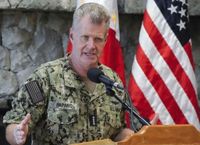INCHEON, April 11 (Yonhap) -- The United States has expressed a willingness to handle tariff negotiations with South Korea and Japan as smoothly as possible, Seoul's Trade Minister Cheong In-kyo said Friday, describing the U.S.' openness as a key outcome of his visit to Washington. "We held various discussions aimed at ensuring smooth trade relations with the Trump administration," Cheong told reporters at Incheon International Airport upon returning from his two-day visit to Washington.
Cheong's trip marked the first of its kind by a senior South Korean trade official since the Donald Trump administration announced country-by-country reciprocal tariffs, including 25 percent duties for South Korea, that took effect this week.
During his stay in Washington, Cheong met with U.S. Trade Representative (USTR) Jamieson Greer and other key officials to discuss the tariff issue. "The biggest achievement of the visit was establishing a framework for item-by-item negotiations, particularly concerning steel and automobiles," Cheong said, adding that Washington showed a willingness to reach an agreement with both Seoul and Tokyo in an "amicable" manner.
He also emphasized the importance of identifying the appropriate U.S. agency as Seoul's main negotiation counterpart. "Determining which U.S. agency would be our dialogue partner was crucial," he said, noting that Greer will primarily lead the negotiations on behalf of Washington. Cheong added that he thoroughly conveyed South Korea's position on the issue of reciprocal tariffs. "Greer actively listened to our stance, and shared the U.S. perspective and expectations for South Korea," he said, describing the nature of the talks.
On Wednesday (U.S. time), President Donald Trump imposed a 90-day pause on reciprocal tariffs, saying that negotiations with countries requesting meetings over tariff issues would begin "immediately." At the same time, he warned China against retaliatory measures, raising tariffs against China to 125 percent. In retaliation, China announced plans to raise tariffs on all U.S. goods from 84 percent to as much as 125 percent starting Saturday.
Regarding concerns that a potential U.S.-China trade conflict could negatively impact South Korean businesses, Cheong said the government would work closely with local companies to find optimal response strategies. "We will actively seek support measures through close consultation with affected businesses," he said.
In related developments, U.S. President Donald Trump is signaling plans to link defense cost-sharing with future tariff negotiations with South Korea. On April 10, 2025, at a Senate Armed Services Committee hearing, Indo-Pacific Commander Adm. Samuel Paparo warned that pulling out U.S. forces would embolden North Korea. "With the loss of the force on the Korean Peninsula, there’s a higher probability that [Kim Jong Un] would invade," Paparo said. "Inherently, it would reduce our ability to prevail in conflict." His remarks highlighted concerns that troop reductions could undermine regional stability and provoke aggression from Pyongyang.
Gen. Xavier Brunson, commander of U.S. Forces Korea, who also testified at the hearing, said the current troop level is appropriate and warned that any cuts would be "problematic." "We gain a lot [from our presence in Korea]," Brunson said. "There are financial elements, but also irreplaceable material and logistical support." He noted that the U.S. Navy uses South Korean shipyards for vessel maintenance and emphasized that American forces play a critical role in strengthening the Indo-Pacific Command’s surveillance and deterrence capabilities against North Korea.
As the negotiations unfold, the relationship between the U.S. and South Korea will be closely monitored, particularly given the implications for regional security and economic stability. The outcomes of these discussions could set a precedent for future trade relations in the Indo-Pacific region, especially as both nations navigate the complexities of the global economic landscape.




